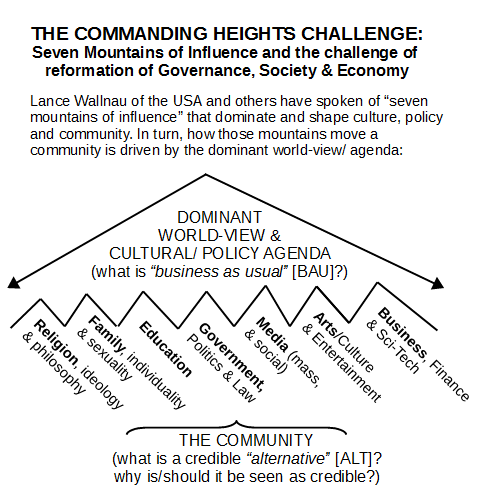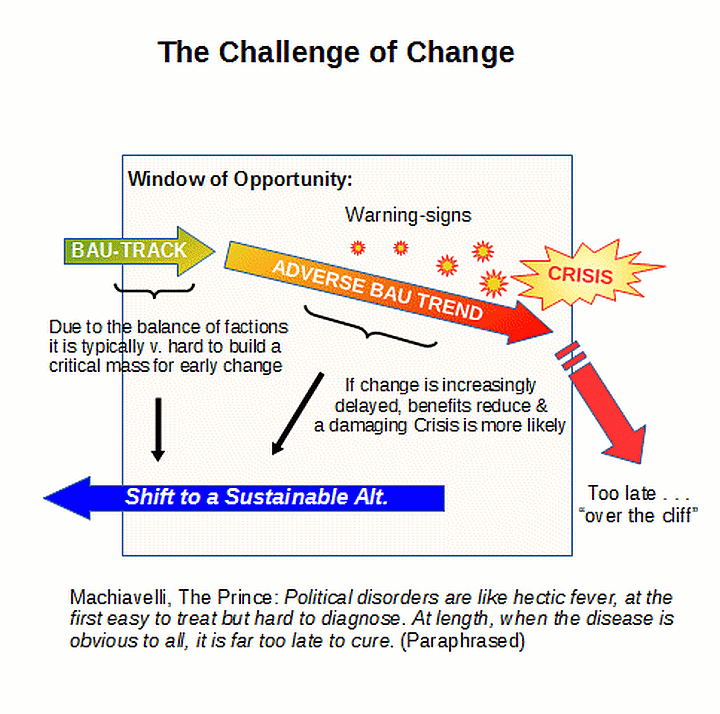Sometimes, one of our frequent objectors has a truly noteworthy letting- the- cat- out- of- the- bag moment that is worth headlining. In the still live CT2 thread, AK unwittingly exposes the incoherence and implied amorality of atheistical, evolutionary materialism when he comments in key part:
AK, 80: >>Since the moral fabric is man made, all we are doing is seeing it change, as it has done over the centuries. Sometimes history shows that the change has been for the good, and sometimes for the bad. But since civilization is thriving, it is reasonable to conclude that we have had more wins than losses.>>
Note first, “[s]ince the moral fabric is man-made.”
Here, the question is clearly begged in grand style. In answer, it is certain that we are morally governed by ought (which is often different from what is and challenges it). For particularly relevant instance, the force of persuasion in AK’s argument pivots on the enduring nature of our minds being governed by duties to serve truth, rationality and justice etc. So, the argument parasites off what it would undermine: we find ourselves ineluctably under moral government, under moral law. A law so deeply embedded in our nature as reasoning, responsible agents that those who object actually depend on our adhering to the laws they object to in order to gain some power of persuasion.
So, immediately, we see deep incoherence and can instantly dismiss the assertions as little more than currently fashionable confident manner, manipulative, parasitical question-begging.
Then, in expanding on “all we are doing is see it change,” we see the telling incoherence: “[s]ometimes history shows that the change has been for the good, and sometimes for the bad.”
In short, having just denied an enduring yardstick of morality, instantly one is smuggled back in. Oops.
As in, how do we ever tell the difference between for the good/bad, apart from might and/or manipulation make such so and what AK favours is by definition good while what he frowns on is by definition bad? (As in, these words are little more than a radical secularist power grab to enforce its preferences in the name of being “the brights” etc?)
This of course opens the door to might and manipulation make ‘right’/ ‘rights’/ ‘truth’/ ‘logic’/ ‘justice’/ ‘knowledge’ etc. Which is outright nihilism. As was pointed out to AK in the thread but which was, predictably, studiously ignored.
After all, one may often rhetorically drown out an inconvenient point by brazenly ignoring it and drumming on with one’s favourite talking points and hobby horses, especially if they are the fashion of the day. Here, turning medical practitioners into licenced killers in the name of “end of life care,” promoting cynical counterfeits of marriage under false colour of law [which directly undermines a central stabilising institution, family, and corrupts many others: courts, media, education, parliaments etc], teaching young children the techniques of sexual vices and perversions in the name of education, enabling the ongoing holocaust of our living posterity in the womb [currently a million further victims per week] and the like.
Given that a fallacy is by definition a misleading but often persuasive argument, such tactics are why some key cases need to be identified, highlighted and corrected, so that the balance on the merits may be plain to those who need help in seeing through the fallacies involved.
Going further, a key underlying appeal is to subjectivism, relativism and emotivism as the roots of morality. Accordingly, the following observations (which were cited in thread but — predictably — were studiously ignored) are well worth noting. So, I headline an excerpted chapter summary, on Subjectivism, Relativism, and Emotivism, in Doing Ethics 3rd Edn, by Lewis Vaughn, W W Norton, 2012. [Also see here and here.]:
>> . . . Subjective relativism is the view that an action is morally right if one approves of it. A person’s approval makes the action right. This doctrine (as well as cultural relativism) is in stark contrast to moral objectivism, the view that some moral principles are valid for everyone.. Subjective relativism, though, has some troubling implications. It implies that each person is morally infallible and that individuals can never have a genuine moral disagreement
Cultural relativism is the view that an action is morally right if one’s culture approves of it. The argument for this doctrine is based on the diversity of moral judgments among cultures: because people’s judgments about right and wrong differ from culture to culture, right and wrong must be relative to culture, and there are no objective moral principles. This argument is defective, however, because the diversity of moral views does not imply that morality is relative to cultures. In addition, the alleged diversity of basic moral standards among cultures may be only apparent, not real. Societies whose moral judgments conflict may be differing not over moral principles but over nonmoral facts.
Some think that tolerance is entailed by cultural relativism. But there is no necessary connection between tolerance and the doctrine. Indeed, the cultural relativist cannot consistently advocate tolerance while maintaining his relativist standpoint. To advocate tolerance is to advocate an objective moral value. But if tolerance is an objective moral value, then cultural relativism must be false, because it says that there are no objective moral values.
Like subjective relativism, cultural relativism has some disturbing consequences. It implies that cultures are morally infallible, that social reformers can never be morally right, that moral disagreements between individuals in the same culture amount to arguments over whether they disagree with their culture, that other cultures cannot be legitimately criticized, and that moral progress is impossible.
Emotivism is the view that moral utterances are neither true nor false but are expressions of emotions or attitudes. It leads to the conclusion that people can disagree only in attitude, not in beliefs. People cannot disagree over the moral facts, because there are no moral facts. Emotivism also implies that presenting reasons in support of a moral utterance is a matter of offering nonmoral facts that can influence someone’s attitude. It seems that any nonmoral facts will do, as long as they affect attitudes. Perhaps the most far-reaching implication of emotivism is that nothing is actually good or bad. There simply are no properties of goodness and badness. There is only the expression of favorable or unfavorable emotions or attitudes toward something.>>
Such should give serious pause to those inclined to run with today’s popular, heavily promoted notions on moral government. Going further, they all imply that our sense of being bound by duty (starting with the life of the mind) is delusional, a grand delusion that pervades our world of thought, speech and action. They thus must be self-referentially incoherent. They also imply that our life of the mind is governed by delusion, i.e. they imply grand delusion and contradict the requisites of rationality.
Such can be safely set aside.
We then must start afresh, taking our moral, rational, responsible agency seriously.
A good first test case was laid out in the thread (and was of course studiously ignored by AK):
>> a good yardstick case to start from is that it is self-evidently evil to pounce on, kidnap, bind and gag, sexually torture and assault a young child on the way home from school then murder the child to prevent being caught, all for one’s pleasure. Start from that the child has neither strength nor eloquence to resist or persuade. From this, much else will emerge.>>
The child, clearly, has legitimate rights despite its lack of strength to impose might or eloquence to impose manipulation. Rights that inhere to his or her nature and worth as a human being. Which of course cannot be grounded on origin by meaningless, purposeless cumulative lucky accidents filtered by reproductive advantage in a wholly materialist world that has no IS in it that can bear the awesome weight of OUGHT.
Besides, such evolutionary materialism is self-refuting as an account of the minds used to think evolutionary materialistic thoughts. As J B S Haldane long since put ever so pithily:
>>”It seems to me immensely unlikely that mind is a mere by-product of matter. For if my mental processes are determined wholly by the motions of atoms in my brain I have no reason to suppose that my beliefs are true. They may be sound chemically, but that does not make them sound logically. And hence I have no reason for supposing my brain to be composed of atoms. In order to escape from this necessity of sawing away the branch on which I am sitting, so to speak, I am compelled to believe that mind is not wholly conditioned by matter.” [“When I am dead,” in Possible Worlds: And Other Essays [1927], Chatto and Windus: London, 1932, reprint, p. 209. (NB: DI Fellow, Nancy Pearcey brings this right up to date (HT: ENV) in a current book, Finding Truth.)]>>
What, then, is an is capable of bearing the weight of ought, of moral government?
Post Hume, there is but one level that such can be found, or we still have an ungrounded ought. Namely, the world-root level. IS must be fused to OUGHT in the world root, on pain of ungrounded ought and its consequences as we already saw.
For that, after centuries of debates, there is but one serious candidate: the inherently good and wise creator God, a necessary and maximally great being; one worthy of loyalty and the responsible, reasonable service of doing the good in accord with our evident nature.
That’s not a theological dogma, it is a philosophical invitation to comparative difficulties assessment. If you object, simply put up a serious alternative that can pass the comparative difficulties tests of factual adequacy, coherence and balanced explanatory power: _____ . (The challenge is to do that, given that at this level there are but few serious candidates. Predictably, on track record, this challenge will be ducked or brushed aside.)
So, we find that this case of a key inadvertent admission against interest by one of our frequent objectors opens the door to serious examination of our civilisation’s dominant worldviews and cultural agendas. An adapted form of the seven mountains illustration may be helpful:
In turn, that opens up room to reflect on where we are heading as a civilisation, and what we must do to turn back before it is too late:
Food for thought. END

